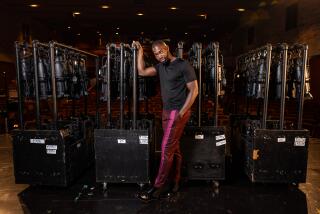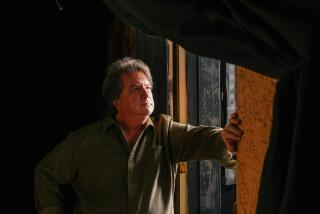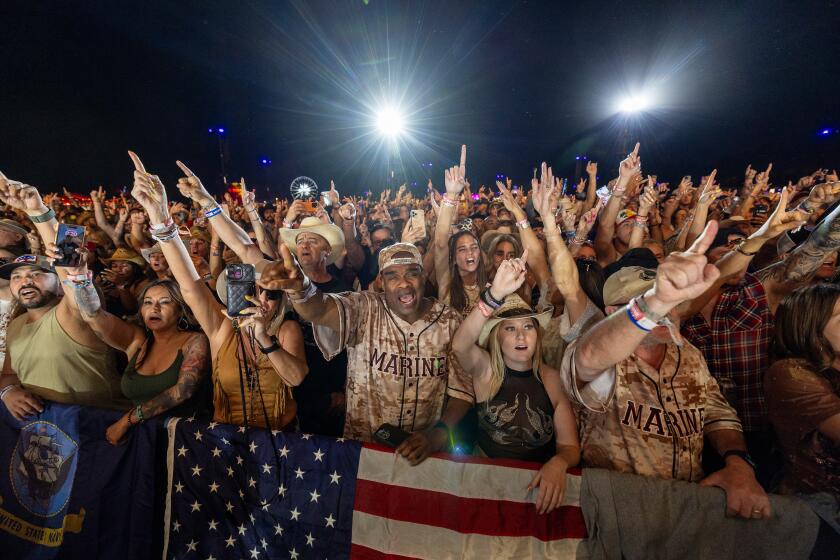Donald Margulies raises more moral questions in ‘Time Stands Still’
In Donald Margulies’ new play, “Time Stands Still,” a top photojournalist recovers from a near-fatal roadside bomb blast as her long-term relationship with a reporter undergoes its own test of survival. Margulies, whose widely admired plays “Sight Unseen” and “Collected Stories” uncovered the personal wounds inflicted on the battlefronts of art and fiction writing, now takes as his subject a creative couple who have met, worked and loved amid the all too real mortal combat of the Middle East.
Directed by Dan Sullivan, a frequent collaborator with Margulies since directing the Pulitzer Prize-winning “Dinner With Friends” in 1998, “Time Stands Still,” is yet another of this philosophical dramatist’s attempts to grapple with issues of moral uncertainty looming at the intersection of art and society. It premieres at the Geffen Playhouse this week.
“This is not an Iraq play,” Margulies says on a day at the Geffen when the actors are first digging their way into the text, seated at a table with Margulies and Sullivan as the play is read aloud.
“I would like to dispel the notion that it is a political play; it’s really a love story,” he says during a break for lunch. “Yes, there are ideas in it, but my plays are not about the ideas but about the people. It’s the story of James and Sarah, and what they’ve been through together and what their lives are like.”
Most American playwrights, even the successful ones, do not earn a living writing plays, as the economics of the theater push them ever closer toward the status of poets. It’s reason for despair and long faces, but Margulies remains a soberly upbeat character, pensive in conversation but thankful for the audience he has built and the honors and commissions that have come his way. That has allowed him to pursue his plays of ideas, inhabited by, if not the ruling class, then by the trend-setting, media-savvy class, distilling “conversations we have had but that I haven’t seen on the stage before,” as he puts it.
In his new work, James (David Harbour) is a principled war correspondent recovering from a breakdown occasioned by an overexposure to the misery and gore of armed conflict. Sarah (Anna Gunn), his injured lover, begins to question the ethics of her profession as she recuperates from the explosion that killed the Iraqi driver with whom she happened to be having an affair.
“The germ of the play,” Margulies says, “was an image I had of a loft apartment, and I began to speculate about who lives here, and I thought, what if it was a photographer? And what if it was a female photojournalist and she’s just come back from the war? And what if she’s been hurt? That’s really where it began.”
Another couple, the senior photo editor of a publication that might be the New York Times Magazine (played by Robin Thomas) and his perky event-planner girlfriend ( Alicia Silverstone), fill out the cast.
“Frequently I like writing about people who are articulate and whose humor comes out of them and their behavior and not out of humor that is imposed on them,” the playwright says, as if keenly aware that his later plays take place in the realms of what is broadly termed the intelligentsia, far from the screech and howl of popular culture.
“My plays often deal with the problem of being an artist,” he says, meaning the crises of conscience that afflict creative people reckoning with the moral compromises their work sometimes entails.
Sarah’s conscience
In the case of Sarah in “Time Stands Still,” it’s the growing fear that she has traded successfully on the impoverished victims of war and deprivation -- the subjects who end up in the pages of magazines and in handsome books resting on the coffee tables of Manhattan’s affluent elite.
In a twist on the line from Tennessee Williams’ Blanche DuBois, Sarah at one point tells James, “I live off the suffering of strangers. I built a career, a reputation, on the sorrows of people I don’t know and will never see again.”
For his part, James has retreated from the horrors of the battlefield into the comfort of analyzing horror films for a webzine back home, finding solace under the protection of American cultural ironies. So it is that the spiritual paths of these journalists diverge amid the provocative arguments one can expect in a Margulies play.
“I like Donald’s serious heart as a writer,” says Sullivan. “And this is a serious work. I think much of it is about the impact of the choices made by the press, but it’s really a love story, and that supersedes everything else.”
“It’s what photography does, it captures and freezes time,” Margulies says about the title. “I thought it a euphonious title. It seemed appropriate.
“When I say that the play deals with the morality of photojournalism, I didn’t know that I was writing a play about that. But it emerged in the writing, and then I discovered it was a theme. But that’s true of everything I’ve written. It’s not like I have a checklist of themes. It’s exciting to me, it’s why I continue to do this; I’m always making discoveries like that.”
Margulies, who grew up in Brooklyn and lives in New Haven, Conn., where he teaches a course in playwriting at Yale, has a long history with Southern California. His early play “The Model Apartment” had its world premiere at the Los Angeles Theatre Center in 1988 (and wasn’t done in New York until 1995, when it won an Obie). South Coast Repertory commissioned “Sight Unseen” in 1990 and later “Collected Stories” and gave both those plays their world premieres before they went on to success in New York and elsewhere. (South Coast is reviving “Collected Stories” this spring.) SCR also commissioned “Shipwrecked,” which was later done at the Geffen, which commissioned “Time Stands Still.”
Given that he also gets regular work writing for Hollywood (most of it unproduced, including a Keith Moon biopic for Mike Myers), you might think Margulies has reason to have a second home here. But, in fact, he stays with playwright and old friend Jane Anderson and her spouse, Tess Ayers, when he comes to town. He looks quizzical when asked if he feels a strong connection to the West Coast. “I don’t feel like I’m part of any community here. I have friends . . . . “
Yet he does not belong to the New York theater world either. “It’s funny, maybe because I’ve lived out of New York for so long, I don’t feel that I’m part of that. When I won the Pulitzer, I heard from very few contemporary colleagues, very few, which should tell you something. It really was amazing. I did hear from the older generation -- they were very generous.”
Not long ago, he met playwright Suzan-Lori Parks at an event in New York and, after introducing himself to her (“Suzan-Lori, I’m Donald Margulies”), she said: “Can I hug you?”
“I said, ‘Please. Please hug me.’ ”
“If Donald had a community, it was in wanting to acknowledge his Jewish identity but not be bound by it,” says Jerry Patch, the former dramaturge at South Coast Rep who helped develop “Sight Unseen” and Margulies’ “Brooklyn Boy” and is now director of artistic development at the Manhattan Theatre Club. “From the time he was writing as a son in 1995 to later writing as a spouse and father, he was dealing with whether to assimilate or not assimilate.”
Margulies’ “The Loman Family Picnic” and “The Model Apartment” are both less naturalistic and more rooted in the Jewish culture of his boyhood than his later and more celebrated plays. In “Sight Unseen,” a transitional play in his body of work, the celebrity painter Jonathan Waxman, who is Jewish, goes looking for the shiksa lover who was an early inspiration for him. Margulies himself married a Gentile, a doctor.
“I don’t think of myself as a Jewish writer,” he says. “My subject matter often brings Jewishness to the foreground, and being a Jew has been an ingredient in things I’ve written.”
“He was kind of ahead of the game,” Patch says of the first chapter of Margulies’ career, when his plays were more whimsical and less grounded in realism. “But that did not get him the response that the more realistic ones did. If you believe in the notion of the playwright as shaman, the writer has to find a voice with which he can communicate with an audience, and Donald found that voice.”
And he seems to have found his director in Sullivan, the former Seattle Rep artistic director who is famous for his work with the new plays of Wendy Wasserstein, Jon Robin Baitz and Herb Gardner.
“Over the last few days I’ve appreciated all over again what it is I cherish in having him,” Margulies says. “Having a good director is a bit like choosing a shrink. You want somebody who’s going to be a couple of steps ahead of you, who ‘gets’ you, who you feel that kinship with but who knows something before you even realize it, and that’s something I feel in working with Dan.
“He has the ability to express things about my work and my characters that I would not be able to convey to an actor. I don’t have the right vocabulary.”
‘Crowded with details’
Sullivan, 69, first met Margulies, 54, in 1998, when an agent brought him “Dinner With Friends.” “He’s wonderfully obsessed by the subject of the artist versus the culture,” says Sullivan. “I like the goodness at the core of his people. There are no villains in his plays. Everyone is trying to do the right thing.”
Which can be more challenging than melodrama. “He likes to come at things obliquely, and so the challenge is how to keep the narrative in front of you and honor the naturalistic style of the piece,” the director says. “It’s crowded with details, so there’s a lot of picking and choosing, but these are good problems to have.”
There’s a scene in “Time Stands Still” in which James goes on a rant about the empty piety of a play he has seen about Third World suffering that assuaged the guilt of its liberal audience without making a difference in the state of the world. It’s very much a Margulies moment, and he remarks on it now, explaining its relevance. “Because theater is yet another representation of life -- and of horror -- artificial by definition, like photography or film. And the way we incorporate it in our culture, it becomes just a night out, and that interests me a great deal. I’m not judging, I’m just enjoying making the connections and the reverberations. These are dilemmas we live with.”
Comparing his new play to “Collected Stories,” he says, “What they have in common is that they both deal with the kind of cannibalism that is part of being an artist drawing from the world. You’re taking things, you’re using them. I’m not making a judgment about artists being bad people. I just think it’s the nature of being an artist, it’s a response to the world.”
He asks aloud, “What’s morally justifiable?” then answers. “It’s all relative. That’s part of the argument of the play.”
More to Read
The biggest entertainment stories
Get our big stories about Hollywood, film, television, music, arts, culture and more right in your inbox as soon as they publish.
You may occasionally receive promotional content from the Los Angeles Times.






